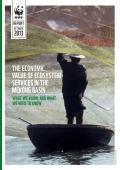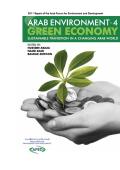
In green economies, natural capital is incorporated into measurement of societal progress and equity, and recognized and managed as a fundamental pillar of economic and human well-being. The Lower Mekong region must demonstrate success in living up to commitments to maintain ecosystem integrity before claims to having ‘greened’ growth can be made. A first step in making this commitment is ensuring that there is adequate information available on the socioeconomic importance of ecosystems and the services they provide. Ecosystem services valuation is a basic component of the evidence base for decisions to invest or divest in maintaining natural systems.
The greening of economic growth series ESCAP, its partners and Asia-Pacific countries have advocated "green growth" as a strategy to achieve sustainable development in the resource-constrained, high-poverty context of the Asian and the Pacific region. The conventional "grow now, clean up later" approaches to economic growth are increasingly placing the futures of regional economies and societies at risk. The forward-thinking policymaker is tasked to promote development based on eco-efficient economic growth and at the same time, record more inclusive gains in human welfare and socio-economic progress. In order to assist policymakers in responding to such challenges, ESCAP’s activity on green growth has been developed to focus on five paths: sustainable infrastructure development; investment in natural capital; green tax and budget reform; sustainable consumption and production; and the greening of business and markets. The ESCAP “Greening of economic growth” series provides policymakers with quick access to clear, easy-to-read guidance to specific "green growth" policy tools and actions.
This report describes an evolving policy landscape in Asia and the Pacific characterised by a changing economic reality, rising demand for resources, increasingly apparent impacts of climate change and increased risk and uncertainty. It provides insights into Asian and Pacific resource use trends and outlines key actions that governments can pursue to help bring economic growth strategies in closer alignment with the objective of sustainable development. It also provides examples of strategies for improving resilience to help deal with the increasing levels of risk faced by societies and economies. The report is the product of a combined effort by three institutions: the Asian Development Bank (ADB), the United Nations Economic and Social Commission for Asia and the Pacific (ESCAP) and the United Nations Environment Programme (UNEP).
This summary was prepared by Eldis.
Sustainable Energy is the sixth in the series of annual reports produced by the Arab Forum for Environment and Development (AFED) on the state of Arab environment. The report highlights the need for more efficient management of the energy sector, in view of enhancing its contribution to sustainable development in the Arab region.

